每日观察:关注3月份美国智能手机市场份额(5.7)
1)comScore最近报告显示,2013年3月份美国智能手机用户已达1.367亿,其中Android和iOS用户占比达91%。Android用户为7110万,iPhone用户为5350万。
从2012年12月至2013年3月,美国智能手机普及率上升9个百分点,达到58%。
苹果在美国智能手机设备制造商中所占比例高达39%(上升2.7%),三星位居其次,占比21.7%(上升0.7个百分点),HTC占比9%,摩托罗拉占比8.5%,LG占比6.8%。
Android仍是位居首位的智能手机平台,占比52%(下降1.4%);而iOS市场份额则增长2.7个百分点,达到39%;黑莓排名第三,占比5.2%(下降1.2个百分点);微软Windows Phone增长0.1个百分点,占比3%,Symbian比例降至0.5%(下滑0.1%)。
2)据pocketgamer报道,苹果App Store最近已开始制裁那些允许用户向好友推荐应用的第三方工具(含有应用检索功能),但并未宣布官方消息。
观察者认为,除了违反App Store 2.25条款的应用之外,含有“筛选、书签、检索或分享推荐功能”的应用也都可能被移除,现在苹果似乎已将这一条款延伸至那些通过电子邮件或社交网络进行分享,以及在应用中检索App Store内容的第三方应用。
有匿名开发者自称其应用(主要功能是向用户好友分享推荐内容)已因此被App Store移除,他们认为苹果此举可能意在让App Store成为应用推荐服务的唯一供应商和经销商。
3)据gamasutra报道,亚马逊Appstore最近进入中国市场(游戏邦注:该应用商店两年前在美国上线,之后向欧洲扩展),针对该地区推出付费和免费应用服务。值得注意的是,亚马逊此举比谷歌先行一步,后者应用商店Google Play在中国仅推出免费应用和游戏。
现在亚马逊已是首家在中国推出付费Android应用的西方科技公司,不久还将面向澳大利亚、巴西、加拿大、印度、南非和韩国等世界其他地区开放服务。
4)据gamezebo报道,PopCap最近通过Facebook页面发布预告视频,宣布将于今年7月推出《植物大战僵尸》续作《Plants vs. Zombies 2: It’s About Time》。
5)据pocketgamer报道,EA日前与迪士尼签署多年独家授权协议,将基于《星球大战》角色和故事开发新游戏。E虽然获得了基于该IP针对硬核游戏用户开发产品的权利,迪士尼仍将保留面向手机、社交、平板电脑和在线平台开发内容的“部分权利”。
EA称公司旗下的BioWare仍将开发《星球大战》游戏(此前开发了《星球大战:旧共和国》),位居瑞典的DICE和美国加州的Visceral也仍将据此开发新游戏。
6)NPD最近报告预测,到2017年平板电脑销量将是笔记本电脑的6倍。2013年平板电脑出货量将增长67%,达到2.565亿台,到2017年将达5.794亿台。而该时期笔记本电脑出货量将下降10%,从原来的2.033亿台降至1.833亿台。
(本文为游戏邦/gamerboom.com编译,拒绝任何不保留版权的转载,如需转载请联系:游戏邦)
1)Apple gains platform market share, Android and iOS combines for 91% of smartphone user base
Scott Reyburn
Although Google’s Android operating system remained the top smartphone platform, Apple once again gained market share, according to ComScore’s March 2013 Mobile Subscriber Market Share report. Also, the Android OS and Apple’s iOS combined for 91 percent of the U.S. smartphone user base of 136.7 million.
During the three month period from the end of December 2012 to the end of March 2013, the smartphone market penetration was up 9 percent to 58 percent, translating to 136.7 million users owning smartphones, with 71.1 million users who own Android smartphones and 53.5 million who own iPhones.ComScore top smartphone OEMs March 2013
The Reston, Va.-based analytics firm reported that Apple claimed the No. 1 spot as the top smartphone original equipment manufacture (OEM) with 39 percent — up 2.7 percent — of the U.S. smartphone OEM market share. Samsung nabbed the No. 2 position with a 21.7 percent market share, up 0.7 percent. Keep in mind that it won’t be another month or two before Samsung’s market share sees an effect from the recently launch Samsung Galaxy S4. Rounding out the bottom of the top smartphone OEMs chart was HTC with a 9 percent market share, Motorola with 8.5 percent and LG with 6.8 percent.
As per usual, the Android OS was the top smartphone platform with 52 percent market share, down 1.4 percent. Apple’s platform share rose once again, increasing 2.7 percent to 39 percent.
BlackBerry came in at No. 3 with 5.2 percent share, falling 1.2 percent. Microsoft’s Windows Phone OS increased 0.1 percent to 3.0 percent and Accenture’s Symbian OS dropped 0.1 percent
to 0.5 percent.(source:insidemobileapps)
2)Apple extends 2.25 banhammer to apps with sharing, recommendation and App Store search tools
by Keith Andrew
Apple has begun clamping down on third-party tools that allow users to recommend apps to their friends, with releases equipped with an app search facility also now prohibited.
No official announcement has been made, but PocketGamer.biz understands that apps are now liable to be rejected if they feature “filtering, bookmarking, searching, or sharing recommendations.”
We’ve been contacted by one developer whose app discovery tool has recently been blocked by Apple because it includes such features, with App Store regulation 2.25 – which restricts apps that could be confused by consumers as app stores in their own right – cited within the reasoning.
Share and share alike?
As a result, it appears Apple has stretched the remit of 2.25 to cover sharing via email or social networks. The ability to search the App Store within third-party apps also now seems to be restricted.
It’s a move that, in theory at least, threatens scores of titles already active within Apple’s ecosystem – and, for the first time, not just those engaged in pure app discovery, either.
“Our app is primarily focused on sharing recommendations to your friends,” the developer, who wished to remain anonymous, told us.
“I have not seen this rejection notice before and believe that it is a new one. We thought that basing our recommendations on sharing was suitable for Apple, as it had previously stated that if you bake in social or local into your app discovery, you would be fine.
“However, either we are not social enough, or Apple is going back on its position. Either way, it appears the scope of 2.25 continues to grow and I think they aim to be the only provider of
recommendations for apps, along with being the distributor.”(source:pocketgamer)
3)Amazon’s next big step: Android Appstore launches in China
By Mike Rose
As Amazon prepares to go global with its Android Appstore, the company made a huge step into the Chinese market over the weekend, launching its paid and free app online store in the country.
The online store originally launched two years ago in the U.S. and later expanded to Europe. This expansion to China is part of the company’s worldwide plans.
Notably, Amazon potentially has the upperhand over Google, as the latter’s Play Store only features free apps and games in China.
Amazon is now the first Western technology company to directly offer paid Android apps in China, notes Reuters, although it will still have to compete with hundreds of other local app distribution companies.
The company says that it is working with software developers to increase the number of apps and games available via its Appstore in China.
The Amazon Appstore will also launch soon in various other countries worldwide, including Australia, Brazil, Canada, Mexico, India, South Africa and South Korea.(source:gamasutra)
4)PopCap announces official title and release date of Plants vs. Zombies sequel
By Joe Jasko
It feels like I’ve been waiting four whole years for a proper sequel to my favorite plant-themed strategy game, Plants vs. Zombies. Oh wait a minute, that’s because it has been four whole years since the original Plants vs. Zombies was first released on PC and Mac platforms back in 2009. Rumors began circulating early this year that the sequel would come with the subheading “Garden Warfare,” but the lack of any real confirmation from the zombies themselves left many of us fans thinking: what’s taking so long PopCap?!
This is why it is so deliciously fitting that PopCap has officially named the long-awaited sequel Plants vs. Zombies 2: It’s About Time. And no, that isn’t a tongue-in-cheek joke here:
this is actually going to be the name of the new game. As part of today’s big unveiling, PopCap has posted a funny announcement video on their Facebook page, which showcases many internet goers and PvZ fans asking that same burning question: where the heck is Plants vs. Zombies 2?
Plants vs. Zombies 2: It’s About Time will be released in July 2013, right in the middle of summer, when our sunflowers and pea shooters are sure to be in full bloom. That release is getting closer by the second, and luckily we still have this month’s Plants vs. Zombies Adventures to meet our daily dose of Crazy Dave while we wait.(source:gamezebo)
5)As EA get core console licence, Disney retains Star Wars IP for mobile, tablet and web games
by Jon Jordan
EA has signed what it calls a “new multi-year exclusive licensing agreement” with Disney to make new games based on the Star Wars characters and storylines.
But while EA gets the ability to make what is referred to titles for the “core gaming audience, spanning all interactive platforms and the most popular game genres”, Disney is retaining “certain rights” for mobile, social, tablet and online games.
EA said that its team at BioWare will continue to develop Star Wars games (it previously developed Star Wars: The Old Republic), while DICE in Sweden and Visceral in California will also work on new games.
It doesn’t appear that EA has access to direct licences for the forthcoming Star Wars films, due from 2015 however.
New hope
“This agreement demonstrates our commitment to creating quality game experiences that drive the popularity of the Star Wars franchise for years to come,” said John Pleasants, co-president of Disney Interactive.
“Collaborating with one of the world’s premier game developers will allow us to bring an amazing portfolio of new Star Wars titles to our fans around the world.”
“Every developer dreams of creating games for the Star Wars universe,” said EA Labels president Frank Gibeau.
“The new experiences we create may borrow from films, but the games will be entirely original with all new stories and gameplay.”(source:pocketgamer)
6)Tablets will outsell laptops 6 to 1 by 2017 as mobile PC market hits 579.4 million
John Koetsier
This year, we’ll buy more tablets than notebooks for the first time ever. But by 2017, we’ll buy six times more tablets than laptops, according to market researcher NPD.
“The mobile PC industry is undergoing significant change,” NPD senior analyst Richard Shim said in a statement. “The rapid rise and establishment of white box tablet PCs … is putting pressure on traditional notebook PCs … resulting in cannibalization by tablet PCs.”
NPD’s latest report suggests that tablet shipments will grow 67 percent this year to 256.5 million and will reach a massive 579.4 million in 2017. In contrast, laptop or notebook PCs will decline 10 percent over the same period, dropping from 203.3 million to 183.3 million.(source:venturebeat)

























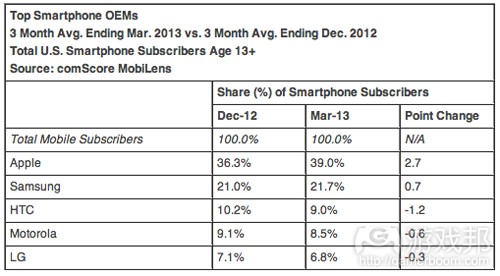
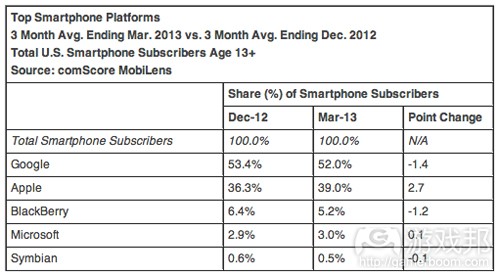
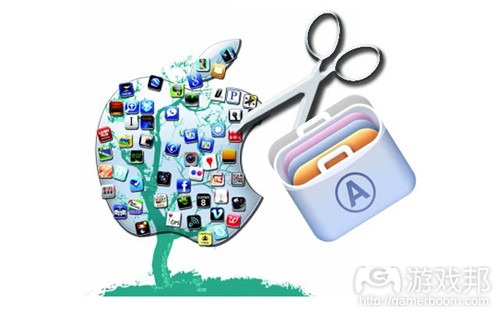

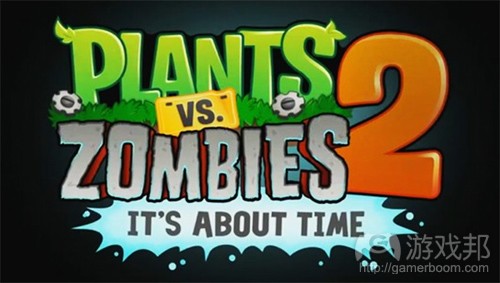
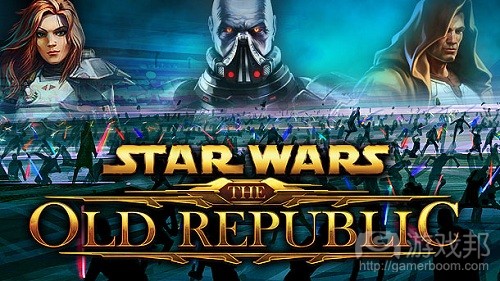
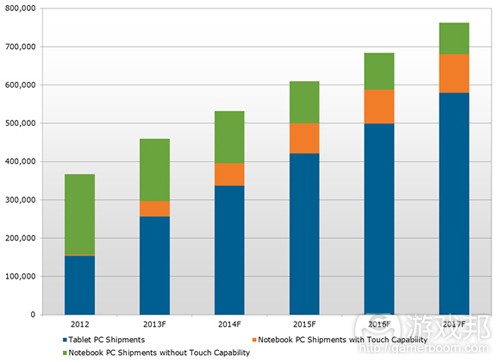














 闽公网安备35020302001549号
闽公网安备35020302001549号